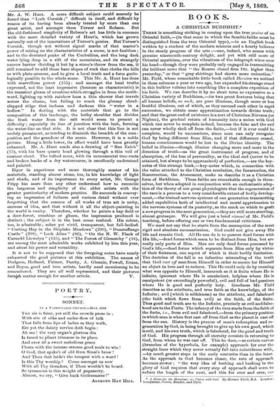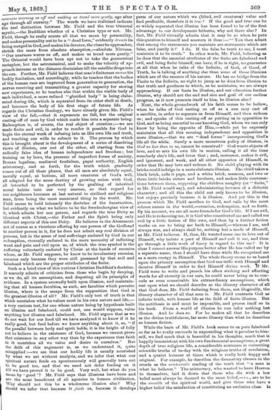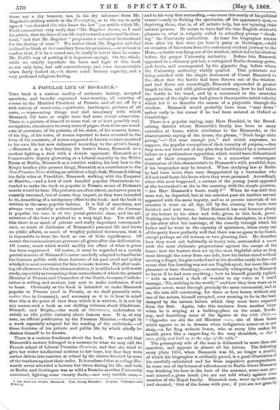A CHRISTIAN BUDDHIST.*
THERE is something striking in coming upon the true genius of an Oriental faith,—(in that sense in which the Semitic faiths must be distinguished from the true Oriental type), —in an English book written by a student of the modern sciences and a hearty believer in the steady progress of the arts ;—one, indeed, who muses with genuine nineteenth-century delight, and yet with still more of Oriental mysticism, over the vibrations of the telegraph wires over his head—though they were probably only engaged in transmitting the brilliant news that "the Bourse closed firm 18e. higher than yesterday," or that "grey shatings had shown more animation." Mr. Field, whose remarkable little book called Heroism we noticed in these columns a year or two ago, has expanded his strange creed in this bulkier volume into something like a complete exposition of his faith. We can describe it by no short term so expressive as a Christian variety of Buddhism,—its two great features being that all human beliefs, as such, are pure illusions, though more or less fruitful illusions, out of which, as they succeed each other in rapid succession, we obtain some approximation towards divine truth; and that the great end of existence is a sort of Christian Nirvana (or Nigban), the gradual return of humanity into a union with God which can never be complete indeed, because the false and the evil can never wholly shell off from the finite,—but if it ever could be complete, would be unconscious, since man can only recognize God by being different from Him, and if that difference ceased, human consciousness would be lost in the Divine identity. The belief in illusion—though illusion changing more and more in the direction of truth—as the great instrument of progress, and of absorption, of the loss of personality, as the ideal end (never to be attained, but always to be approached) of perfection,—are the keynotes of this strange book,—key-notes which, in connection with the value attached to the Christian revelation, the Incarnation, the Resurrection, the Atonement, make us describe it as a Christian form of Buddhism. These faiths are remarkable enough in themselves, but when adopted in conjunction with an enthusiastic adoption of the theory of our great physiologists that the regeneration of the race is a process to a very considerable extent of bodily development,—the trained nervous systems of one generation transmitting added capabilities both of intellectual and moral apprehension to the nervous systems of its posterity, as the stock on which to graft a new progress in the next generation,—theyare still more startling, almost grotesque. We will give just a brief résumé of Mr. Field's teaching, before offering one or two fundamental criticisms.
We need not say that he starts from the assumption of the most rigid and absolute necessarianism. God could not give away His life and remain God. All He can do is to possess dead forms with His life,—dead forms which seem to be distinct from Him, but are really only parts of Him. Men are only dead forms possessed by God's life,—dead forms which separate from Him only by virtue of their finiteness, one aspect of which is their bodily limitation. The doctrine of the fall is an infantine misreading of the truth that God cast off man from Himself in order to secure for Himself an object to love and to redeem. This He could only do by creating what was opposite to Himself, inasmuch as it is finite where He is infinite, ignorant where He is omniscient, helpless where He is omnipotent (or exceedingly powerful), evil and full of bad passions where He is good and perfectly holy. Goodness Mr. Field describes as the attribute, and true faith as the knowledge, of the Infinite ; evil (which is selfishness) as the attribute, and falsehood (the faith which flows from evil) as the faith, of the finite. Thus good and truth are to the Infinite, precisely as evil and falsehood are to the Finite. The infancy of the race starts from the faith of the finite, i.e., from evil and falsehood,—from the primary position in which man is when first cast off from God as the planet is cast off from the sun. History is the process of man's redemption and regeneration by God, in being brought to give up his own good, which is evil, and his own truth, which is falsehood, for the good and truth of God. His progress through all eternity consists in returning to God, from whom he was cast off. This he does,—as certain curves (branches of the hyperbola, for example) approach for ever the straight lines which they never actually fall into coincidence with, —by much greater steps in the early centuries than in the later. As the approach to God becomes closer, the rate of approach becomes slower ; "the very idea of bathing and basking in the glory of God requires that every step of approach shall seem to reduce the length of the next, and this for ever and ever, our nearness warning us off and making us tread more gently, age after age through all eternity." The words we have italicized indicate the real distinction between Mr. Field and the true Oriental mystic,—the Buddhist whether of a Christian type or not. Mr. Field, though he really scouts all that we mean by personality, and makes personality out to be a "dead form," evidently dreads its being merged in God, and makes his devotee, the closer he approaches, shrink the more from absolute absorptios,—absolute Nirvana. "Our nearness warns us off, and makes us tread more gently." The Oriental would have been apt not to take the geometrical metaphor, but the astronomical, and to make the velocity of approach increase as the distance diminishes till the satellite drops into the sun. Further, Mr. Field believes that man's finiteness means his bodily limitation, and accordingly, while he teaches that the bodies of the human race are improved from generation to generation, the nerves receiving and transmitting a greater capacity for storing new experiences, so he teaches also that within the visible body of each individual, a more refined "glorified body" is being elaborated during life, which is separated from its outer shell at death, and becomes the body of his first stage of future life. As regards the Christian theology, we have already given Mr. Field's view of the fall,—that it represents no fall, but the original casting-off of man by God which made him into a separate being. Redemption is, of course, the real object of creation ;—we are made finite and evil, in order to render it possible for God to begin the eternal work of infusing into us His own life and truth, and teaching our wills to submit to it. The process by which this is brought about is the development of a series of dissolving views of illusion, one out of the other, all starting from the radically false idea of human independence and freedom ; but training us by laws, the pressure of imperfect forms of society, Roman legalism, medimval feudalism, papal authority, English aristocracy, and so forth, for the truth which gradually comes out of all these phases, that all men are absolutely equal, morally equal, at bottom, all mere creatures of God's will, all adapted for the same destiny of growing union with God, all intended to be perfected by the grafting of inherited moral habits into our very essence, so that regard for our neighbours becomes at last natural to civilized and religious man, from being the most unnatural thing in the world. Mr. Field seems to hold intensely the doctrine of the Incarnation, but evidently on what we believe to be the Swedenborgian view of it, which admits but one person, and regards the true Deity as identical with Christ,—the Father and the Spirit being only different aspects of this one Deity. He believes in the Atonement not of course as a vicarious offering by one person of the Godhead to another person in it, for he does not admit any real division of persons, but in the sense of real sufferings endured by God in our redemption, eternally endured in the mere necessity of inflicting want and pain and evil upon us, of which the true symbol is the suffering voluntarily endured by Christ at the hands of enemies whom, as Mr. Field supposes, he knew to be involuntary enemies, enemies only because they were still possessed by that evil and falsehood which are the proper attributes of the finite.
Such is a brief view of this curious Christian Buddhist's doctrine. It scarcely admits of criticism from those who begin by denying, as we do, all its assumptions, and disputing all its principles of evidence. In a system avowedly built upon illusion, and maintaining that all human faculties, as such, are faculties which perceive illusion, where is the escape from the supposition that God is the greatest illusion of all ? Mr. Field's only test of truth is that which nourishes what he values most in his own nature and life,— a very curious test, for one whose nature being by hypothesis built on illusion and falsehood, could not, one would suppose, value anything but illusion and falsehood. Mr. Field argues that as we do not wait for our food till we have analyzed it to know if it be really good, but feed before we know anything about it, so, "if the parallel between body and spirit holds, it is the height of folly not to believe in the existence of God, because we cannot prove that existence in any other way than by the experience that faith In it nourishes all we value and desire in ourselves." But the drift of this argument is, as we understand it, quite misapplied :—we see that our bodily life is usually nourished by what we eat without analysis, and we infer that what our Spiritual nature feeds on spontaneously will generally turn out to be good too, and that we need not defer feeding on it till we have proved it to be good. Very well, but what do you mean by ' good '? Mr. Field says that illusions have been and are the most beneficent of all agencies in human civilization. Why should not this be a wholesome illusion also? Why should we infer that because it feeds us, because it develops parts of our nature which we (blind, evil creatures) value and find profitable, therefore it is true! If the good and true can be so widely separated that illusion has been found to be of the first advantage to our development hitherto, why not there also ? In fact, Mr. Field virtually admits that it may be so when he puts this question to himself and answers it thus:—"' You then admit that among the statements you maintain are statements which are false, and justify it?' I do. If the false be truth to me, I must maintain it to be truth." In other words, Mr. Field, believing as he does that the essential attributes of the finite are falsehood and evil, and being finite himself, can have, if he is right, no guarantee at all that when he talks of the Infinite, of God, of Good, of Truth, he is talking of anything else than some of those illusions which are of the essence of his nature. He has no bridge from the Finite to the Infinite, no right to jump as he does from illusion to that truth and goodness to which, as he maintains, we are always approaching. If our basis be illusion, and our education further illusion, why should not the end and aim and goal of our endless progress, as it now presents itself to him, be illusion also ?
Next, the whole groundwork of his faith seems to be hollow, when he talks of God casting us off as a sun may east off a satellite, in order to separate us from Himself, and then redeem us ; and speaks of this casting-off as putting us in opposition to God, and as being essential to our knowing God, whom we can only know by being the opposite of Ilim,—while yet he expressly maintains that all this seeming independence and opposition is mere illusion,—that we are "dead forms" incorporating God's life all the while. Surely a more monstrous policy of illusion, in God no less than in us, cannot be conceived ? God wants objects of love, and so sets his own life in motion, calling it all the time somebody else's life, and loves that ; and, moreover, makes it evil, and ignorant, and weak, and all other opposites of Himself, in order that He may love and redeem it. No child playing with its bricks could indulge in a more elaborate illusion. The child takes a black brick, calla it papa, and a white brick, mamma, and two or three little bricks sisters and brothers, and makes little conversations between them, supposing the children naughty (or "finite," as Mr. Field would say), and administering lectures of a didactic character ; and all this the child not only knows to be illusion, but enjoys precisely because it is illusion. And yet this is the process which Mr. Field ascribes to God, and calls by the most solemn names in the world,—creation, redemption, and so forth. By his account, we are all mere funnels for God's life. If I am evil, and He is redeeming me, it is God who constituted me and called me evil by a little fiction of His own, and then by a further fiction works on me to bring me back to Himself,—whereas I am, and always was, and always shall be, nothing but a mode of Himself, as Mr. Field believes. If, then, He wanted some one to love out of Himself, why isolate a part of Himself and call it me, and then go through a little work of fancy in regard to this me? It is clear I cannot answer His purpose better after He has called me by a separate name, than I should have done while He recognized me as a mere energy in Himself. The whole theory seems to us based upon the primary assumption that God can trifle with Himself and deceive Himself in order to find Himself divine work. If Mr. Field were to write and preach his often striking and affecting words for all eternity in our ears, he could never bring us to concede as even conceivable his extraordinary assumptions, which rest upon what we should describe as the illusory character of all that God does, Mr. Field deducing from them, not illogically, the illusory character of all that man is. Mr. Field contrasts God as infinite truth, with human life as the field of finite illusion. But the antithesis is and must be impossible, and proves itself so in his book. From a world of illusion he can infer nothing but illusion. And he does so. For he makes all that he describes as the divine truthfulness, far more illusory than what he describes as human fiction.
While the basis of Mr. Field's book seems to us pure falsehood so far as he really succeeds in expounding what is peculiar to himself, we find much that is beautiful in his thoughts, much that is happily inconsistent with his own fundamental assumptions, a great depth of true religious life, a considerable acuteness in connecting scientific truths of to-day with the religious truths of revelation, and a quaint humour at times which is really both happy and original. For example, he describes the damuatory clauses in the creeds as the aristocratic reading of the truth that "a man is what he believes." The aristocracy, who wanted to have Heaven to themselves, laid it down that those who die with a low belief must always be doomed to the same belief,—i.e., are to be the canaille of the spiritual world, and give those who have a higher belief the satisfaction of constituting an exclusive clan. Is there not a dry humour, too, in his dry inference from Mr. Bagehot's striking article in the Fortnightly, as to the use in early ages of "an elevated elite who know the law" (an article which Mr. 'Field summarizes very well) that "Mr. Bagehot shows, as I read his article, that the lines of our life tend towards a universal brotherhood," and that Mr. Bagehot "prophesies a universal brotherhood for the destiny of man "? We rather think Mr. Bagehot will feel inclined to blush at that corollary from his premisses,—or at least to confess that, if it be a sound one, he really is better than he seems. Mr. Field's way of putting it is ingenious enough. On the whole, while we utterly repudiate the basis and logic of this book as not only false, but self-contradictory, and even inconceivable when fairly looked at,—it shows much literary capacity, and a very profound religious feeling.
































 Previous page
Previous page